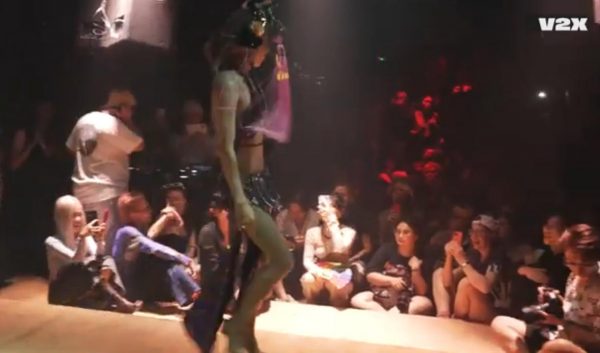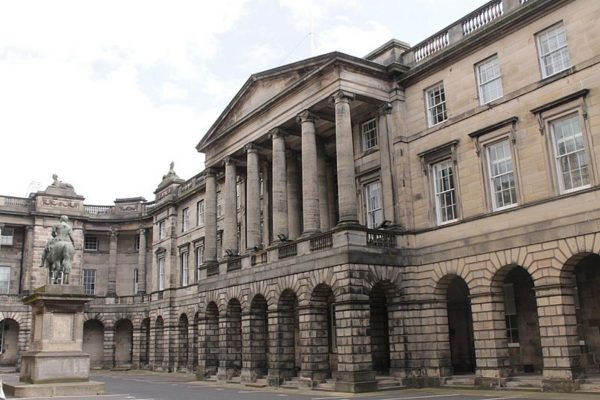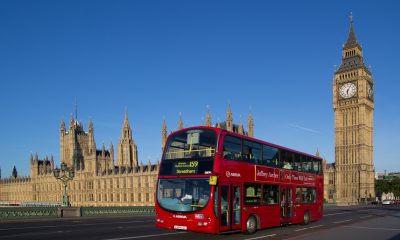World
Out in the World: LGBTQ news from Europe and Asia
Malaysian prime minister reiterated opposition to LGBTQ rights at UN

AUSTRALIA
A group has petitioned the Australian Human Rights Commission for an exemption to hold ‘Lesbians Born Female only’ events that exclude transgender people at the Victorian Pride Center for the next five years.
Lesbian Action Group Melbourne, wrote in their petition to apply for the exemption that the group, exclude “heterosexual, bisexual and gay males, heterosexual and bisexual females, transgender people and queer plus people.”
The Sydney Star Observer, Australia’s largest LGBTQ media outlet, reported that the event would be held to celebrate International Lesbian Day at the Victorian Pride Center on Oct. 15, 2023.
Under Australian codes the AHRC is empowered under Section 44 of the Sex Discrimination Act of 1984 (Cth) to grant temporary exemptions for up to five years from the provisions of the anti-discrimination law.
According to the Star-Observer, the group said it was set up to promote and organize events for “lesbian born females “without the fear of being hauled before the Victorian Civil and Administrative Tribunal, as we have in the past and told our exclusive lesbian born female events are illegal and having to cancel them.”
The group claimed that over the past two decades, they were able to “organize and hold private lesbian meetings and gatherings over these past 20 years to avoid any more challenges by the transgender community.” The application then went on to allege that “lesbians who publicly speak out about lesbian rights are also sacked from their jobs, ridiculed and threatened with all kinds of abuse.”
Basketball star suspended over anti-gay remarks
Australian NBL professional basketball star Corey Webster was suspended for two games after he posted homophobic remarks to his X/Twitter social media account. In the now deleted tweets, Webster replying to a post that asked: “What’s the first thing that comes to mind when you see this flag,” accompanied by the LGBTQ Rainbow Pride flag,” said: “mental illness.”
After Perth Wildcats fans and followers started calling out him for the blatant homophobia Webster posted a follow-up that read in all caps: “PROTECT THE CHILDREN,” and put his social media profile on private.
The team reacted issuing an apology and also released an apology from Webster. In his statement the player said:
“While it certainly wasn’t my intent, I understand the hurt my comments have caused and I am sincerely sorry for this. It wasn’t how I intended my comments to be perceived and I will take a break from social media and use that time to better educate myself on the impact comments such as this can make on individuals I may have offended.”

Perth Wildcats team owner Richard Simkiss said: “We are really disappointed in these comments and have made this clear to Corey. They don’t reflect our values, and we have committed to working with Corey to help educate him about the harm such comments can bring. As a community driven club, we stand for inclusiveness and have strongly supported the NBL’s Pride Round. We look forward to promoting this initiative again in the upcoming season. Our values are clear — we want to bring people together in a positive way and we understand our responsibility as leaders in the community to live these values both on and off the court.”
VIETNAM

A decidedly queer subculture import from the U.S. that gained rapid popularity this vibrant southern Vietnamese metropolis is providing a safe haven for gay and trans youth.
Al Jazeera contributor Xuan-Tung Le reported during a recent event, a catwalk for would-be models with fiery dance-off battles, as well as an emotional celebration of kinship between Vietnam’s queer people — all rolled into a single evening of deep connections for trans people especially.
Le notes that not to be confused with ballroom dancing, which evolved from the heterosexual courtship tradition of European aristocrats, ballroom culture emerged in the 1960s among marginalized Black and Latino queer people in the U.S.
Gathering at a “ball” function, queer people “walk” to show off their talents in dancing, lip-syncing, performing and catwalk modelling as a way to both compete on the night and, more broadly, transcend the everyday realities of gender identities, occupational roles and social status assigned in society.
Viral videos of voguing battles have also been helped by the digital power of YouTube and TikTok algorithms, giving people around the world access to the dance form Le added.
“Ballroom is more than dancing,” Minerva Sun Mizrahi, using a stage name preferring that their real name not be used, told Al Jazeera.
“Here, people can vogue, do runway walk, or simply look and act straight-passing — all are considered talents,” Minerva said.
“It is a space to empower queer people.”
Another queer performer told Al Jazeera that social acceptance of transgender people also lags behind in Vietnam, even in Saigon where gay men and women enjoy relative acceptance in society. Naomi Sun, also using a preferred stage name, told Al Jazeera: “That is why ballroom events are so unique, as they are one of the few safe spaces in Saigon where trans women can just ‘let loose and have fun,’” Sun said.
“You don’t have to do anything to your body or take hormones; just dress up as a fem queen [which is the ballroom slang for a trans woman], go there, and live your dream as a fem queen,” she said. “It’s fine! That’s how ballroom is.”
Related: Vietnam’s “ballroom” culture: A safe space to celebrate trans people (link)
MALAYSIA
In an interview with CNN’s Christiane Amanpour, Malaysia’s Prime Minister Anwar Ibrahim says Malaysia will never recognize LGBTQ rights. Recently prison sentences were threatened for selling rainbow watches. “I wouldn’t defend that,” Ibrahim told the veteran journalist. He says he’d like to see things change, but must respect the consensus of the people.
Anwar said that as prime minister, he has to respect the consensus of Malaysians and that they do not accept public displays of LGBTQ (people and issues.) “The Muslims, non-Muslims, Christians, Hindus or Buddhists, they have a consensus in the country. They do not accept this (LGBTQ+),” he said. However, he said while there is a need to exercise some degree of tolerance, harassment has to be avoided.
UNITED KINGDOM

A 17-year-old teenage boy from South Wales has been publicly named after being convicted and sentenced on Sept. 21, for a homophobic and racist vandalism crime spree in South Wales and Cardiff.
Haynes and a second 15-year-old male accomplice carried out several racially and homophobically charged counts of criminal damage across South Wales, including extremist Nazi graffiti on a Windrush mural in Port Talbot where the teen was living at the time.
British LGBTQ media outlet PinkNewsUK reported that just hours after the mural, depicting local beloved nurse Donna Campbell and her mother Lydie, was complete, it was daubed with swastikas, the words “Nazi zone,” and a racial slur.
The presiding justice, Jeremy Baker, sent the teen to jail for one year and seven months and ordered the former Royal Air Force Cadet to an additional one year’s probation.
According to Sky News, Counter terrorism police in Wales last year began investigating the two teenagers in connection with “several offenses of racially and homophobically aggravated criminal damage.”
A smoke bomb was also rolled into the Queer Emporium, an LGBTQ business in Cardiff city center.
The 15-year-old, from Tonyrefail, South Wales, appeared at Cardiff Youth Court and pleaded guilty on Aug. 15 to one charge of criminal damage and four charges of racially aggravated criminal damage. He was given community service for one year, and probation for two additional years and ordered to pay £100 ($122.42) compensation to the Queer Emporium.
In the case of Hayes, Baker said the teen had “essentially became self-radicalized” and held “entrenched” racist, antisemitic and homophobic views.
“I am satisfied that not only did you hold entrenched racist, antisemitic and homophobic views at the time of the commission of these offenses, but that these are views which you have not genuinely disavowed,” the judge told him at his sentencing. “It is apparent that you were not someone who limited your behavior to the expression of your views online, but were prepared to put some of those views into action,” he added.
The judge also noted, “It is of particular concern that not only had you asserted that one of your goals in life was to kill someone … but you had already carried out research as to the availability of one of the components for constructing a gun.”
According to Counter Terrorism Policing Wales Detective Chief Inspector Andrew Williams who spoke at the sentencing:
“For the older boy in particular, it became evident that he was also involved in the online distribution of extreme right-wing material, which clearly fell into the space governed by terrorism legislation,” he said.
“The offences were particularly abhorrent in nature and understandably caused upset to many people, both within the communities the boys targeted, and beyond.
“The sentencing today concludes the investigation and enables professionals to work intensively with them in the hope that they can lead far more productive lives in their respective futures.”

The court battle over to overturn the UK Secretary of State for Scotland Alister Jack’s veto block of the Gender Recognition Reform ended this week with a ruling by Judge Lady Shona Haldane of the Court of Session in Edinburgh not expected for “some time” according to a statement from the court.
Haldane said after the judicial review concluded a day earlier than expected — that she will take “some time” to reach her decision on the matter. She added she write her opinion following what she described as a “unique, very interesting and challenging case.”
The Gender Recognition Reform bill introduced by the Scottish government to Parliament last spring was passed in a final 86-39 vote days before this past Christmas 2022. The sweeping reform bill modifies the Gender Recognition Act, signed into law in 2004, by allowing trans Scots to gain legal recognition without the need for a medical diagnosis.
The measure further stipulates that age limit for legal recognition is lowered to 16.
Jack had released a statement indicating that with the backing of 10 Downing St., he would use a Section 35 order under the Scotland Act to block the king’s signature which is referred to as royal assent.
Under Section 35 of the Scotland Act, UK ministers can stop a bill getting royal assent. Jack can do so if he is of the opinion that a Scottish Parliament bill would modify laws reserved to Westminster and have an “adverse effect” on how those laws apply.
PinkNewsUK reported the legislation itself was not discussed, with the case instead focusing on whether or not the Jack had the legal right to veto the bill.
Whoever loses the case, when Haldane issues her ruling, will have the right to appeal the outcome at the Court of Session Inner House. Whoever loses that appeal will have the option to take the case to the Supreme Court in London.
This means, regardless of the result, the political and legal battle could go on for months, or even years.
Additional reporting from the Star Observer, Al Jazeera, CNN, Sky News and PinkNewsUK
Latin America
Protests, demands for rights define Pride month in Latin America
More than 3 million people participated in São Paulo march

Activists across Latin America marked Pride month with massive demonstrations, cultural activities, and demands that their countries guarantee equality and protect LGBTQ people from violence.
From Santiago, Chile, to Mexico City, activists took to the streets to celebrate the rights that have been won and the many that are still pending.
Chile
The Pride march that the Movement for Homosexual Integration and Liberation (Movilh) and Fundación Iguales organized took place in downtown Santiago, the country’s capital, on June 22. Authorities and the two organizations say more than 120,000 people participated.
Under the slogan “Pride with memory and hope,” marchers demanded lawmakers approve a bill that would allow reparations for LGBTQ Chileans who Gen. Augusto Pinochet’s dictatorship targeted. There were also calls for the government to promote an LGBTQ-inclusive educational reform.
“This time we are marching on high alert,” said Movilh spokesperson Javiera Zúñiga. “For the first time in decades, we are losing achieved rights. We demand the state wake up. The reform of the Zamudio Law has been stalled for 13 years.”
Marches also took place in Valparaíso, Antofagasta, Temuco, and Concepción, highlighting the growing visibility of transgender groups and feminist organizations.
Mexico
Mexico City on June 29 was the epicenter of one of the region’s largest Pride marches.
More than 300,000 people participated in the march. Comité IncluyeT organized the 46th annual march under the slogan “Not one step back: rights are respected.”
Several organizations denounced the increase in hate crimes — Mexico’s National Observatory of Hate Crimes notes more than 80 LGBTQ people have been reported murdered in the last year. They also urged Mexican lawmakers to criminalize transfeminicides across the country.
Argentina
Although Buenos Aires’s official Pride march takes place in November, the Argentine LGBT+ Federation and other groups in the Argentine capital and in other cities across the country in June organized activities.
More than 5,000 people on June 24 marched from Plaza de Mayo to the Argentine Congress to reject the government’s dismantling of public policies. President Javier Milei’s decision to eliminate the country’s Women, Gender, and Diversity Ministry and cut sexual health programs were among the moves the protesters denounced.
“Today Pride is also resistance to the adjustment,” pointed out Comunidad Homosexual Argentina, an LGBTQ advocacy group.

Colombia
Thousands of people in Bogotá, the Colombian capital, and the cities of Medellín, Cali, and Barranquilla marched on June 29.
The marchers’ slogan was “diversity is also peace,” in a context where violence against LGBTQ people remains high. Caribe Afirmativo, a Colombian LGBTQ rights group, notes more than 45 people from the community has been reported killed in the country over the last 12 months, with most of them trans women.
Organizations also demanded lawmakers resume debate of a bill that would extend comprehensive protections to LGBTQ Colombians. The measure has been stalled in Congress since 2023.
Brazil
More than 3 million people participated in the 28th São Paulo LGBTQ+ Pride Parade that took place on the city’s Paulista Avenue on June 22.
The parade took place under the slogan “LGBT+ social policies: we want the whole thing, not half of it.” Organizers demanded expanded access to health care, employment, and education for the most vulnerable communities, especially Black trans people. They also denounced ultraconservative figures who seek to curtail LGBTQ rights.
Peru and Paraguay
More than 15,000 people took part in a Pride march in Lima, the Peruvian capital, on June 28. Participants demanded lawmakers approve a trans rights law, which has been stalled in the Peruvian Congress since 2016, and recognition of civil unions.
Members of SomosGay, a Paraguayan LGBTQ rights group, and other organizations participated in a Pride march that took place in Asunción, the country’s capital, on June 29.
The march took place without incident, despite threats and anti-LGBTQ hate speech on social media. Participants demanded an end to anti-LGBTQ discrimination and rhetoric from social and religious groups.
Central America
Upwards of 2,000 people participated in a Pride march in Tegucigalpa, the Honduran capital, on June 22. A Pride demonstration took place in San Salvador, the capital of neighboring El Salvador, on June 28.
India
Anaya Bangar challenges ban on trans women in female cricket teams
Former Indian cricketer Sanjay Bangar’s daughter has received support

Anaya Bangar, the daughter of former Indian cricketer Sanjay Bangar, has partnered with the Manchester Metropolitan University Institute of Sport in the U.K. to assess her physiological profile following her gender-affirming surgery and undergoing hormone replacement therapy.
From January to March 2025, the 23-year-old underwent an eight-week research project that measured her glucose levels, oxygen uptake, muscle mass, strength, and endurance after extensive training.
The results, shared via Instagram, revealed her metrics align with those of cisgender female athletes, positioning her as eligible for women’s cricket under current scientific standards. Bangar’s findings challenge the International Cricket Council’s 2023 ban on transgender athletes in women’s cricket, prompting her to call for a science-based dialogue with the Board of Control for Cricket in India and the ICC to reform policies for trans inclusion.
“I am talking with scientific evidence in my hand,” Bangar said in an interview posted to her Instagram page. “So, I hope, this makes an impact and I will be hoping to BCCI and ICC talking with me and discussing this further.”
On Nov. 21, 2023, the ICC enacted a controversial policy barring trans women from international women’s cricket. Finalized after a board meeting in Ahmedabad, India, the regulation prohibits any trans player who has experienced male puberty from competing, irrespective of gender-affirming surgery or hormone therapy. Developed through a 9-month consultation led by the ICC’s Medical Advisory Committee, the rule aims to safeguard the “integrity, safety, and fairness” of women’s cricket but has drawn criticism for excluding athletes like Canada’s Danielle McGahey, the first trans woman to play internationally. The policy, which allows domestic boards to set their own rules, is slated for review by November 2025.
Bangar shared a document on social media verifying her participation in a physiological study at the Manchester Metropolitan University Institute of Sport, conducted from Jan. 20 to March 3, 2025, focused on cricket performance. The report confirmed that her vital metrics — including hemoglobin, blood glucose, peak power, and mean power — aligned with those of cisgender female athletes. Initially, her fasting blood glucose measured 6.1 mmol/L, slightly above the typical non-diabetic range of 4.0–5.9 mmol/L, but subsequent tests showed it normalized, reinforcing the study’s findings that her physical profile meets female athletic standards.
“I am submitting this to the BCCI and ICC, with full transparency and hope,” said Bangar. “My only intention is to start a conversation based on facts not fear. To build space, not divide it.”
In a letter to the BCCI and the ICC, Bangar emphasized her test results from the Manchester Metropolitan University study. She explained that the research aimed to assess how hormone therapy had influenced her strength, stamina, hemoglobin, glucose levels, and overall performance, benchmarked directly against cisgender female athletic standards.
Bangar’s letter to the BCCI and the ICC clarified the Manchester study was not intended as a political statement but as a catalyst for a science-driven dialogue on fairness and inclusion in cricket. She emphasized the importance of prioritizing empirical data over assumptions to shape equitable policies for trans athletes in the sport.
Bangar urged the BCCI, the world’s most influential cricket authority, to initiate a formal dialogue on trans women’s inclusion in women’s cricket, rooted in medical science, performance metrics, and ethical fairness. She called for the exploration of eligibility pathways based on sport-specific criteria, such as hemoglobin thresholds, testosterone suppression timelines, and standardized performance testing. Additionally, she advocated for collaboration with experts, athletes, and legal advisors to develop policies that balance inclusivity with competitive integrity.
“I am releasing my report and story publicly not for sympathy, but for truth. Because inclusion does not mean ignoring fairness, it means measuring it, transparently and responsibly,” said Bangar in a letter to the BCCI. “I would deeply appreciate the opportunity to meet with you or a representative of the BCCI or ICC to present my findings, discuss possible policy pathways, and work towards a future where every athlete is evaluated based on real data, not outdated perceptions.”
Before her transition, Bangar competed for Islam Gymkhana in Mumbai and Hinckley Cricket Club in the U.K., showcasing her talent in domestic cricket circuits. Her father, Sanjay Bangar, was a dependable all-rounder for the Indian national cricket team from 2001 to 2004, playing 12 test matches and 15 One Day Internationals. He later served as a batting coach for the Indian team from 2014 to 2019, contributing to its strategic development.
Cricket in India is a cultural phenomenon, commanding a fanbase of more than 1 billion, with more than 80 percent of global cricket viewership originating from the country.
The International Cricket Council, the sport’s governing body, oversees 12 full member nations and more than 90 associate members, with the U.S. recently gaining associate member status in 2019 and co-hosting the 2024 ICC Men’s T20 World Cup. The BCCI generated approximately $2.25 billion in revenue in the 2023–24 financial year, primarily from the Indian Premier League, bilateral series, and ICC revenue sharing. The ICC earns over $3 billion from media rights in India alone for the 2024–27 cycle, contributing nearly 90 percent of its global media rights revenue, with the BCCI receiving 38.5 percent of the ICC’s annual earnings, approximately $231 million per year.
Women’s cricket in India enjoys a growing fanbase, with over 300 million viewers for the Women’s Premier League in 2024, making it a significant driver of the sport’s global popularity. The International Cricket Council oversees women’s cricket in 12 full member nations and over 90 associate members, with the U.S. fielding a women’s team since gaining associate status in 2019 and competing in ICC events like the 2024 Women’s T20 World Cup qualifiers. The BCCI invests heavily in women’s cricket, allocating approximately $60 million annually to the WPL and domestic programs in 2024–25, while contributing to the ICC’s $20 million budget for women’s cricket development globally. India’s media market for women’s cricket, including WPL broadcasting rights, generated $120 million in 2024, accounting for over 50 percent of the ICC’s women’s cricket media revenue.
“As a woman, I feel when someone says that they are women, then they are, be trans or cis. A trans woman is definitely the same as a cis woman emotionally and in vitals, and specially, when someone is on hormone replacement therapy. Stopping Anaya Bangar from playing is discrimination and violation of her rights. It is really sad and painful that every trans woman need to fight and prove their identity everywhere,” said Indrani Chakraborty, an LGBTQ rights activist and a mother of a trans woman. “If ICC and BCCI is stopping her from playing for being transgender, then I will say this to be their lack of awareness and of course the social mindsets which deny acceptance.”
Chakraborty told the Blade that Bangar is an asset, no matter what. She said that the women’s cricket team will only benefit by participation, but the discriminating policies are the hindrance.
“Actually the transgender community face such discrimination in every sphere. In spite of being potent, they face rejection. This is highly inhuman. These attitudes is regressive and will never let to prosper. Are we really in 2025?,” said Chakraborty. “We, our mindset and the society are the issues. We, as a whole, need to get aware and have to come together for getting justice for Anaya. If today, we remain silent, the entire community will be oppressed. Proper knowledge of gender issues need to be understood.”
The BCCI and the International Cricket Council have not responded to the Blade’s repeated requests for comment.
El Salvador
La marcha LGBTQ desafía el silencio en El Salvador
Se realizó el evento en San Salvador bajo la lluvia, pero con orgullo

SAN SALVADOR, El Salvador — El reloj marcaba el mediodía cuando los primeros colores del arcoíris comenzaron a ondear frente a la emblemática Plaza del Divino Salvador del Mundo. A pesar de la incertidumbre generada en redes sociales, donde abundaban los rumores sobre una posible cancelación de la marcha por la diversidad sexual, la ciudad capital comenzaba a llenarse de esperanza, de resistencia y de orgullo.
Este año, la Marcha del Orgullo LGBTQ+ en El Salvador se desarrolló en un contexto tenso, en medio de un clima político que reprime y silencia a las voces disidentes.
“Aunque las estadísticas digan que no existimos, viviendo en El Salvador, un país donde hoy, después de décadas de avances, defender los derechos humanos es de nuevo una causa perseguida, criminalizada y silenciada”, afirmaron representantes de la Federación Salvadoreña LGBTQ+.
A pesar de la cancelación del festival cultural que usualmente acompaña la marcha, los colectivos decidieron seguir adelante con la movilización, priorizando el sentido original de la actividad: salir a las calles para visibilizarse, exigir respeto a sus derechos y recordar a quienes ya no están.
A la 1:30 p.m., una fuerte lluvia comenzó a caer sobre la ciudad. Algunas de las personas presentes corrieron a refugiarse, mientras otras, debajo de sombrillas y de los escasos árboles en la plaza, decidieron mantenerse firmes. Los comentarios pesimistas no se hicieron esperar: “a lo mejor la cancelan por el clima”, “no se ve tanta gente como otros años”. Sin embargo, lo que siguió fue una muestra de resistencia: a las 2:05 p.m. las voces comenzaron a llamar a tomar las calles.
Visibilidad como resistencia
La marcha arrancó bajo una llovizna persistente. La Avenida Roosevelt y la Alameda Juan Pablo II se tiñeron de colores con banderas arcoíris, trans, lésbicas, bisexuales y otras que representan a los diversos sectores de la población LGBTQ. Cada bandera alzada fue un acto político, cada paso una declaración de existencia.
Desde la Plaza del Divino Salvador del Mundo hasta la Plaza Gerardo Barrios, frente a Catedral Metropolitana y el Palacio Nacional, la marcha se convirtió en un carnaval de dignidad. Carteles con frases como “El amor no se reprime”, “Mi existencia no es delito” o “Marcho por quien ya no puede hacerlo” se alzaron entre las multitudes.
La movilización fue también un espacio para recordar a quienes han perdido la vida por la discriminación y el rechazo. Familias que marcharon por hijos, hijas o amigues que se suicidaron a causa del estigma. Personas que caminaron por quienes aún viven en el miedo, por quienes no pudieron salir del clóset, por quienes se han ido del país huyendo de la violencia.
Arte, fe y rebeldía
Una de las escenas más llamativas fue protagonizada por Nelson Valle, un joven gay que marchó vestido como sacerdote.
“Hay muchas personas que secretamente asisten a ritos religiosos como en Semana Santa, y les gusta vivir en lo oculto. Pero la fe debe ser algo libre porque Dios es amor y es para todos”, dijo.
Valle utilizó su vestimenta como una forma de protesta contra las estructuras religiosas que aún condenan la diversidad sexual.
“Un ejemplo de persona que abrió el diálogo del respeto fue el papa Francisco, abrió la mente y muy adelantado a su tiempo, porque dejó claro que hay que escuchar a toda persona que quiere encontrar a Dios”, agregó.
La marcha también incluyó bandas musicales, grupos de cachiporristas, carrozas artísticas, colectivos provenientes de distintos puntos del país, y manifestaciones de orgullo en todas sus formas. Fue un mosaico cultural que mostró la riqueza y diversidad de la población LGBTQ en El Salvador.

Una lucha que persiste
Las organizaciones presentes coincidieron en su mensaje: la lucha por la igualdad y el reconocimiento no se detiene, a pesar de los intentos del Estado por invisibilizarlos.
“Nuestros cuerpos se niegan a ser borrados y a morir en la invisibilidad de registros que no guardan nuestros nombres ni nuestros géneros”, declararon representantes de la Federación.
Además, agregaron: “Desde este país que nos quiere callar, levantamos nuestras voces: ¡La comunidad LGBTIQ+ no se borra! ¡El Salvador también es nuestro! Construyamos, entre todes, un país donde podamos vivir con Orgullo.”
El ambiente fue de respeto, pero también de desconfianza. La presencia de agentes policiales no pasó desapercibida. Aunque no hubo reportes oficiales de violencia, varias personas expresaron su temor por posibles represalias.
“Marchar hoy es también un acto de valentía”, comentó Alejandra, una joven lesbiana que viajó desde Santa Ana para participar. “Pero tenemos derecho a vivir, a amar, a soñar. Y si nos detenemos, les damos la razón a quienes nos quieren ver en silencio.”
Rumbo al futuro
Concluida la marcha frente a Catedral y el Palacio Nacional, muchas personas permanecieron en la plaza compartiendo abrazos, fotos y palabras de aliento. No hubo festival, no hubo escenario, pero hubo algo más valioso: una comunidad que sigue viva, que sigue resistiendo.
Los retos son muchos: falta de leyes de protección y que apoye las identidades de las personas trans, discriminación laboral, violencia por prejuicio, rechazo familiar, y una narrativa estatal que pretende que no existen. Pero la marcha del 28 de junio demostró que, aunque el camino sea cuesta arriba, la dignidad y el orgullo no se borran.
La lucha por un El Salvador más justo, más plural y más inclusivo continúa. En palabras de uno de los carteles más llamativos de ese día: “No estamos aquí para pedir permiso, estamos aquí para recordar que también somos parte de este país”.
-

 District of Columbia5 days ago
District of Columbia5 days agoActivists protest outside Hungarian Embassy in DC
-

 Virginia4 days ago
Virginia4 days agoSpanberger touts equality, reproductive rights in Arlington
-

 Books4 days ago
Books4 days agoTwo new books on dining out LGBTQ-style
-

 Theater4 days ago
Theater4 days ago‘Andy Warhol in Iran’ a charming look at intersection of art, politics












